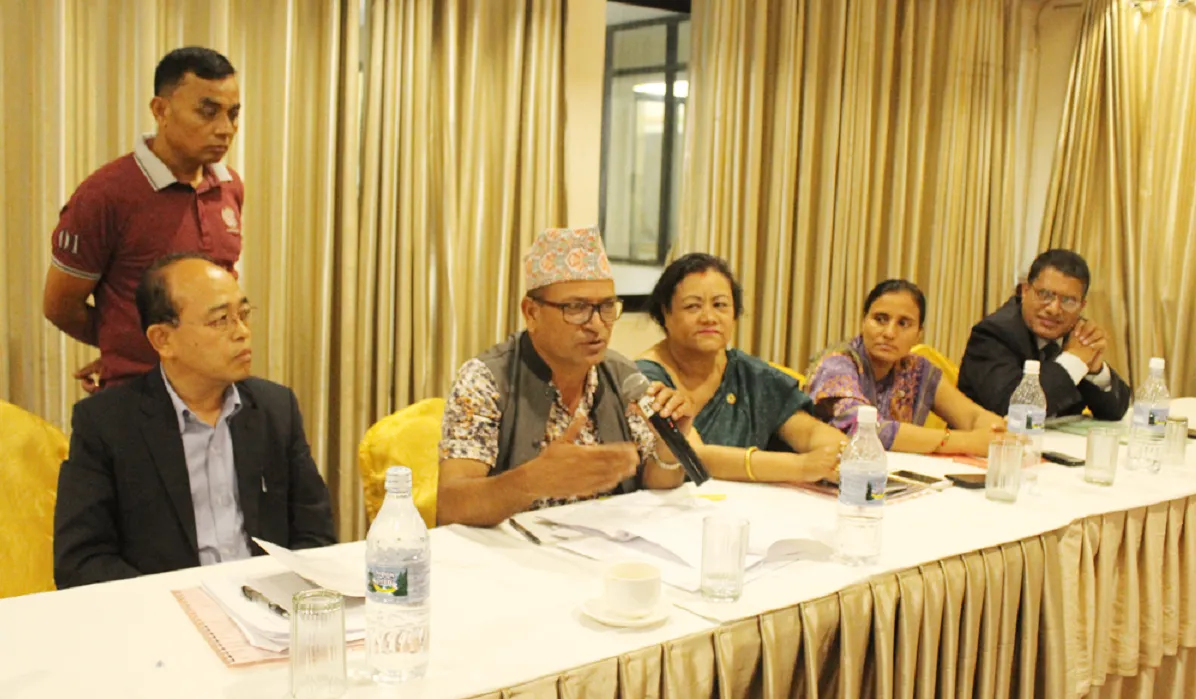Law makers call the revision of the Intergovernmental Financial Management Bill

As part of the ongoing Legal Review Programme, International IDEA and Nepal Law Society (NLS) convened a national-level consultation on 4 September 2017 in Kathmandu, Nepal, to discuss the National Natural Resources and Fiscal Commission Bill and the Intergovernmental Financial Management Bill. The two Bills are are now registred in Parliament, and are considered essential in managing public finance in the context of Nepal’s new federal structure. Around 25 participants—Members of Parliament (MP), fiscal federalism experts and representatives from the civil society—gathered to discuss the provisions and recommendations for amending the Bills to ensure that they comply with the spirit of the Constitution.
The National Natural Resources and Fiscal Commission Bill deals with fiscal and natural resources benefit sharing and distribution between and among three tiers of governments. It stipulates the formation of the National Natural Resources and Fiscal Commission as provisioned in Article 250 of the Constitution, giving mandate to determine extensive grounds and measure, regarding the distribution of revenue from the federal consolidated fund to the federal, provincial and local level governments, distribution of revenue between provincial and local governments from the provincial consolidated fund, and propose debt ceilings for federal, state and local governments.
The Intergovernmental Financial Management Bill deals with revenue power, revenue allocation, grants, loans, budget management, public expenditure, and financial disciplines of the federal, provincial and the local level governments.
Introducing the recommendations that emerged from the Legislative Review Group comprising 10 Nepali lawyers and set up under the International IDEA-NLS initiative, senior advocate Surendra Mahato and Dipendra Jha raised concerns about constitutional as well as practical issues. First and foremost, they pointed out that the Intergovernmental Financial Management Bill seems to retract the federal system of governance that the Constitution implies. More specifically, Bill could be considered to violate a constitutional provision that spells out the Commission’s function, duties and powers (Art. 251). Mr Jha stressed that lawmakers must ensure harmonization with the Constitution when making laws but noted that “the recent law making trend is centralized and ignores the fact that the Constitution has three levels of autonomous governments”.
The legal review undertaken suggested that the Intergovernmental Financial Management Bill is inconsistent with the spirit of the Constitution which mandates the Government of Nepal to make necessary arrangements to equitably distribute the revenue generated by it from its sources, between the federation, province and local level entities (Art.60(2)) in a transparent manner (Art. 60(7)). In addition to this, the review noted that many provisions in the Bill are not practical and that the Bill talks about collecting only two taxes (VAT and Excise Duty) to operate a federal divisible fund, but it is silent to collect from other types of taxes such as income tax, custom duty etc.
Many MPs expressed their concerned that the Intergovernmental Financial Management Bill come from centralized mindset, giving absolute taxation right to the federal government, which may make the local level dysfunctional. Provision contradictions and overlaps the functions and duties of the fiscal commission and the schedules of the tax mentioned overlaps with the schedules in the Constitution related to the powers and jurisdictions of the governments.
One of the key issues that emerged during the interaction linked to the allocation of federal divisible funds that is collected from value added tax and excise duty. The Intergovernmental Financial Management Bill establishes that 78 per cent is allocated to the federal level whereas only 7 and 15 per cent are allocated to province and local level, respectively. Several MPs participating in the meeting raised serious concerns around the rationality behind this distribution in relation to the mandate and the duties attached to province and local level governments.
Some suggestions provided by participants were to reconsider agricultural income tax on poor farmers which at the present is tax exempted; to distribute revenues as per responsibilities given to each government, to insert a clear definition of “divisible fund” in the law, and to ensure revisions of the Bill in line with the Constitution.
Moderator of the programme Kalyan Shreatha, former chief justice of Nepal, concluded by urging parliamentarians to make practical and equitable laws that respect provincial and local autonomy. He also underlined the importance of ensuring that laws adopted are in line with the spirit of the Constitution and the Local Level Governance Bill to promote the harmonization of laws but also cooperativeness, co-existence and coordination between the three levels of government.
The interaction programme was part of International IDEA and Nepal Law Society’s Legislative Review Programme, aiming to review draft Bills that are required to implement Nepal’s new constitution (2015) to make sure that laws are in line with the new constitution and international standards and conventions. The legal review programme is implemented in partnership with the Governance Facility.




